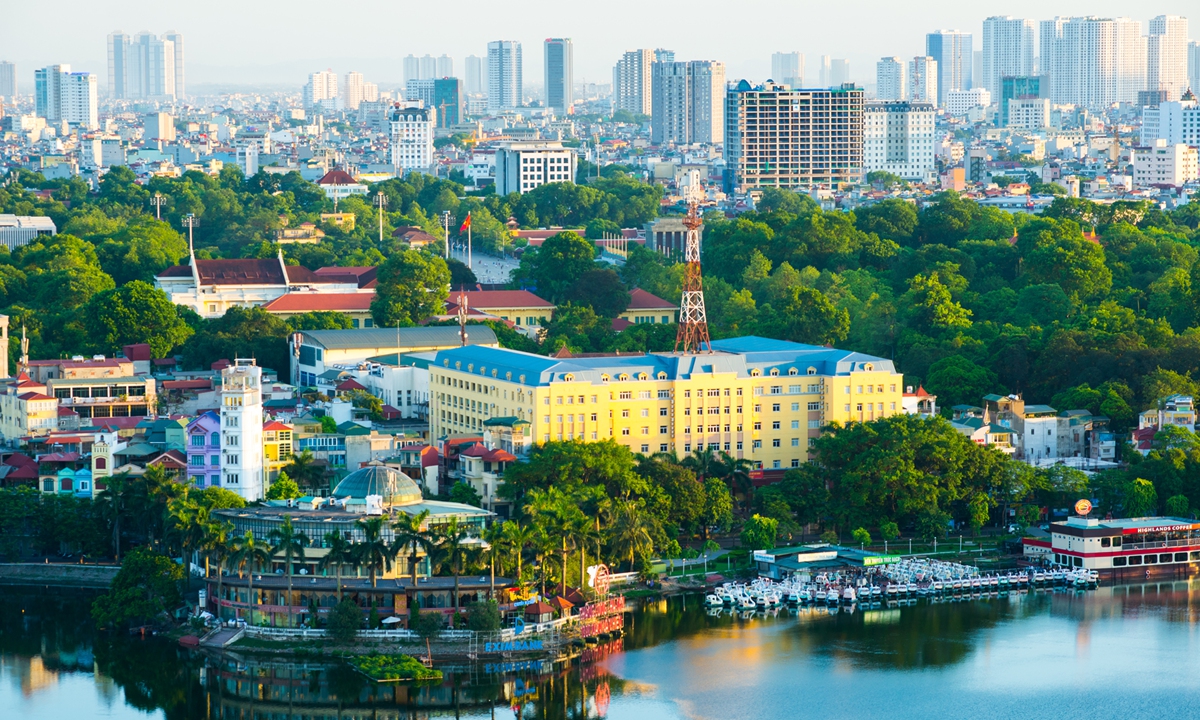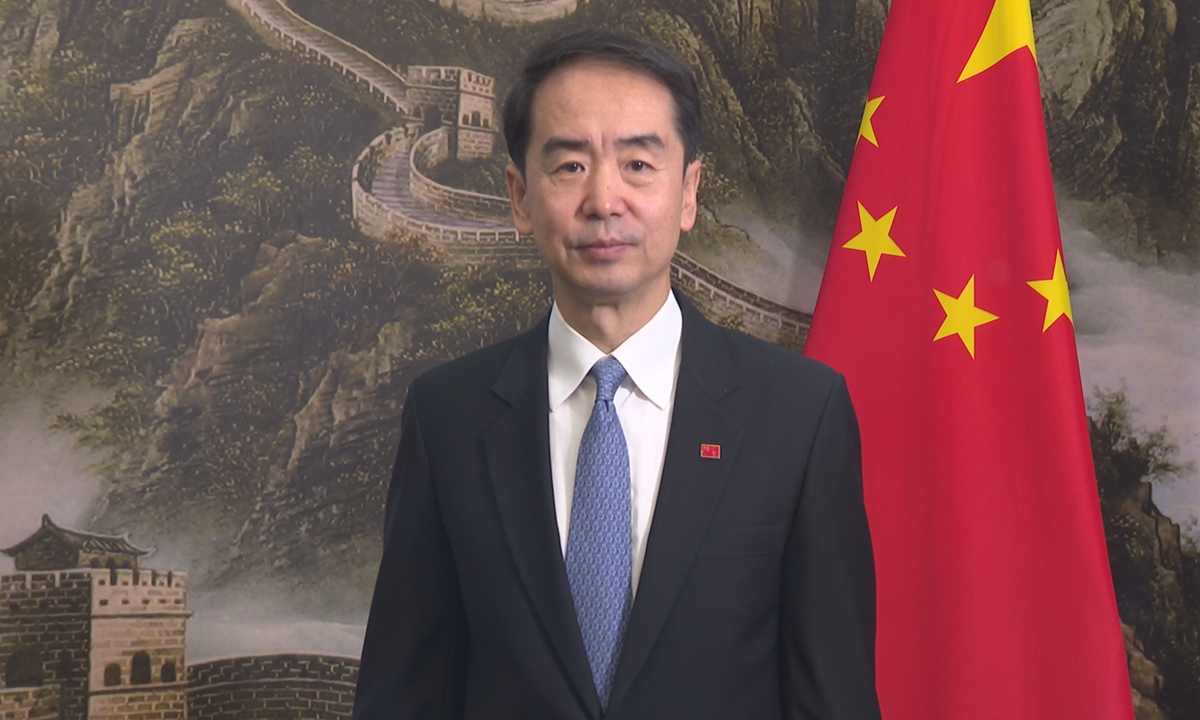
A view of Hanoi, capital of Vietnam Photo: VCG
Editor's Note:
General Secretary of the Communist Party of China Central Committee and Chinese President Xi Jinping will pay a state visit to Vietnam from April 14 to 15, at the invitation of General Secretary of the Communist Party of Vietnam Central Committee To Lam and President of the Socialist Republic of Vietnam Luong Cuong.
Chinese Ambassador to Vietnam He Wei (He) recently told the Global Times (GT) reporters Fan Anqi and Xing Xiaojing in an exclusive interview that this year is of particular significance for bilateral relations, as it marks the 75th anniversary of the establishment of diplomatic relations between China and Vietnam, as well as the Year of People-to-People Exchanges.
He emphasized that the 75-year journey has repeatedly proven that only when China-Vietnam relations develop well can each country's development remain steady, bilateral exchanges and cooperation advance solidly, and the peoples of both nations benefit more from the relationship.
He also stressed that, in today's complex and volatile international landscape, China and Vietnam, both socialist countries, are like-minded comrades and good partners whose future is closely interconnected. In the face of an increasingly turbulent world, China and Vietnam should be defenders of regional peace and stability, promoters of regional cooperation, and upholders of international economic rules and fairness and justice.

Chinese Ambassador to Vietnam He Wei Photo: Courtesy of Chinese embassy in Vietnam
GT: Standing at the historical juncture of the 75th anniversary of the establishment of diplomatic ties between China and Vietnam, how should we review and summarize the historical lessons from the development of bilateral relations? What measures will be taken to elevate China-Vietnam relations to a new level in the future?
He: This year marks the 75th anniversary of the establishment of diplomatic relations between China and Vietnam, as well as the Year of People-to-People Exchanges. It carries special significance for the China-Vietnam relationship. Looking back at the remarkable journey of bilateral ties over the past 75 years, we can clearly identify two "defining moments."
The first "defining moment" was the traditional friendship of "comrades-plus-brothers" personally established by late Chairman Mao Zedong and late Vietnamese president Ho Chi Minh, which laid the "roots" of this friendship. The second "defining moment" was the establishment of the China-Vietnam community with a shared future by President Xi together with the late Vietnamese leader Nguyen Phu Trong and incumbent Lam, which instilled the "soul" of long-lasting friendship.
The two "defining moments" shine through the long course of history, complementing and reinforcing each other. They have become a lasting beacon guiding generations of good-neighborly friendship between China and Vietnam. From these moments, four key lessons can be drawn: A shared belief in upholding the socialist system serves as the "anchoring force" of China-Vietnam relations, providing vital guidance for bilateral ties; a shared history of supporting each other's national liberation is the "ballast," laying a solid foundation for lasting friendship; a shared vision of mutual benefit and win-win cooperation acts as the "accelerator," injecting strong momentum into deepening collaboration; and a shared commitment to opposing bullying is the "propellant," adding the strength of the times to both countries' efforts to uphold fairness and justice.
Standing at a new historical starting point, both sides should follow the important consensus reached by the top leaders of the two parties and countries. Upholding the original aspiration of good neighborliness, strengthening confidence in our chosen path and system, and reinforcing the determination for unity and cooperation, we must work together to solidify the foundation of China-Vietnam relations through high-level political trust, high-quality practical cooperation, and in-depth people-to-people exchanges. These efforts will continue to empower our respective modernization processes, advance the cause of socialism amid global changes unseen in a century, and inject more positive energy into regional and global peace, stability, and development.
GT: China and Vietnam are closely connected in trade and investment. What achievements have been made in bilateral practical cooperation, and how can economic and trade cooperation between the two countries be further elevated?
He: Practical cooperation has long been a highlight of China-Vietnam relations and a key driving force for advancing bilateral ties. In terms of trade, China has remained Vietnam's largest trading partner for over 20 consecutive years. Vietnam has consistently ranked as China's largest trading partner within ASEAN. In 2024, bilateral trade exceeded $260 billion, accounting for roughly one-third of Vietnam's total imports and exports.
As for investment, China ranked first in the number of newly launched investment projects in Vietnam in 2024, with a total investment of $4.73 billion. In terms of industrial cooperation, as the only country with a complete range of industrial categories, China is comprehensively advancing the construction of a strong nation and the great rejuvenation of the nation through Chinese path to modernization, with new industries, new business formats, and new models continuously emerging from new productive forces.
Vietnam is accelerating its industrialization and modernization toward a new era of national rise, with its advantages of being connected to China by land and sea and having complementary structures becoming increasingly prominent. The two sides are blessed with unique conditions and broad prospects for strengthening industrial nesting and expanding the pie of interests.
Looking ahead, to elevate the economic and trade cooperation between the two countries to a higher level, both sides should focus on achieving "four alignments." First, align national development strategies to provide important support for deepening cooperation. Second, align infrastructure connectivity to lay a solid foundation for accelerating cooperation. Third, align industrial integration and development to gather strong momentum for mutually beneficial cooperation. Fourth, align financial cooperation to inject more support for efficient collaboration.
GT: This year marks the "China-Vietnam Year of People-to-People Exchanges." What are the highlights worth looking forward to?
He: Designating this year as the "Year of People-to-People Exchanges" reflects the high expectations that both sides place on consolidating this friendship. This year, both sides will anchor efforts in strengthening "foundation of public opinion" through a series of people-centric, warm, and down-to-earth cultural exchanges. Activities will be meticulously designed around Ho's revolutionary legacy to jointly cultivate more cultural exchange initiatives. Both countries aim to boost cross-border tourism, deepen cooperation in media, sister cities, and education, while intensifying publicity efforts to promote China-Vietnam friendship.
I would especially like to emphasize that the youth represent the future of the China-Vietnam friendship. Through a variety of engaging activities, we will help the youth in both countries to foster mutual understanding, ensuring the torch of friendship is passed on from generation to generation.
GT: What aspects of China are of the greatest interest to various sectors in Vietnam? Can you share with us some heartwarming stories about the bond between the two peoples?
He: People from all walks of life in Vietnam have been paying close attention to China's remarkable achievements in recent years. Some friends who have visited China and experienced high-speed rail, infrastructure and green environment have realized that China's rapid development also brings enormous opportunities to Vietnam. The social consensus that "China-Vietnam friendship is of vital importance" is continuously strengthening, encouraging various sectors of Vietnamese society to better understand, recognize, and feel closer to China.
In my interactions, I've observed that Vietnamese government officials are particularly interested in strengthening the exchange of governance experience between the two parties and countries. Entrepreneurs are keen to expand cooperation with China, while the public is eager to learn about Chinese tech such as DeepSeek and cultural products.
There are many heartwarming stories between China and Vietnam, and the Chinese Embassy itself is a witness to many of them. Our embassy is an ancient building located near Ba Dinh Square, it is said that Ho personally selected the site of the embassy and would often pay visits there. Whenever the lychee trees in the embassy yard bore fruit, the Chinese side would select the best ones to present to Ho.
Every time I walk through the embassy compounds, I can't help but picture the scene from when American aircraft bombed the area around it, and Ho, in sandals, rushed over to check on his Chinese comrades. Only after learning that no one from the embassy had been hurt did he breathe a sigh of relief and was reassured, "While the building is destroyed, it's nothing and we can always build better ones. As long as we're alive, we will continue to fight."
More than half a century has passed. Looking at the lychee trees and ancient buildings of the embassy, although things have changed, China-Vietnam friendship has become an eternal memory for future generations.
Looking ahead, the embassy will continue to serve as a bridge to promote the steady development of the China-Vietnam comprehensive strategic cooperative partnership, and strive to ensure that the outcomes of bilateral cooperation benefit not only our two peoples, but also the region as a whole.
GT: What role can a stable China-Vietnam relationship play in neighborhood diplomacy?
He: The current international landscape is marked by growing instability and turbulence, with ongoing conflicts in Europe and the Middle East, and surging tides of de-globalization, protectionism, and unilateralism. Recently, the US wielded the tariff stick, discarding principles of fairness, justice, and international rules, and resorting to maximum pressure tactics, coercion, and retrogressive moves. These actions have severely destabilized the global economic order, and the world is becoming increasingly volatile.
China and Vietnam are both socialist countries and are good comrades and partners whose future is closely interconnected. The interests of both sides are highly integrated, where prosperity and adversity are mutually shared. In the face of an increasingly volatile world, our two countries must be guardians of regional peace, firmly opposing any actions that undermine regional security, and working together to address emerging risks.
China and Vietnam should also become promoters of regional cooperation, deepen development integration, advance the construction of a high-level interconnected network, strengthen cooperation in industrial and supply chains, and jointly promote regional cooperation to reach new heights.
Moreover, our two countries should stand as defenders of international economic rules, fairness, and justice. In the law of the jungle dominated by bullying and hegemony, there is no place for weak and small nations to survive. We must clearly recognize that without the protection of fair multilateral trade rules, small and medium-sized countries can never receive just treatment under the threat of tariff weapons. We must realize that if we do not unite and grow stronger in the face of hegemony, we will end up being served on someone else's menu.
Therefore, China and Vietnam must remain steadfast in upholding the multilateral trading system with the WTO at its core and resolutely oppose economic bullying. Only in this way can we better safeguard our own interests and the shared interests of all developing countries.





